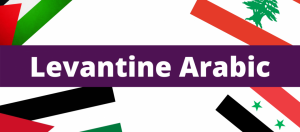Language/South-levantine-arabic/Grammar/Questions
Hi South Levantine Arabic learners! 😊
In this lesson, we will be discussing the grammar rules for forming and answering questions in South Levantine Arabic. Questions are an essential part of everyday communication, and mastering the skills to form and understand questions will improve your South Levantine Arabic speaking ability.
Don't hesitate to look into these other pages after completing this lesson: Conditional Mood, Negation, How to Use Have & Adjectives.
Forming yes-no questions[edit | edit source]
Yes-no questions are questions that can be answered with a yes or no. The basic structure for forming a yes-no question in South Levantine Arabic is the following:
[subject] + [verb] + [question particle]
The question particle for yes-no questions is " هل" (hal), which is added to the beginning of the statement.
For example:
| South Levantine Arabic | Pronunciation | English |
|---|---|---|
| هل أنت تتكلم اللغة العربية؟ | hal anta tatakallam al-lughah al-ʿarabīyah? | Do you speak Arabic? |
| هل الطقس حار اليوم؟ | hal aṭ-ṭaqsṣ ḥār al-yawm? | Is the weather hot today? |
To answer a yes-no question, you can simply answer with a "yes" or "no":
- نعم (na'am) - yes
- لا (lā) - no
Example dialogue:
- Person 1: هل تحب القهوة؟ (hal tuhibbu al-qahwah?) - Do you like coffee?
- Person 2: نعم، أنا أحب القهوة. (na'am, ana uhibbu al-qahwah) - Yes, I like coffee.
Forming WH-questions[edit | edit source]
WH- questions usually start with a question word (i.e., who, what, when, where, why, how). In South Levantine Arabic, the word order of WH- questions is the same as in declarative sentences, which is:
[question word] + [subject] + [verb] + [object]
For instance:
| South Levantine Arabic | Pronunciation | English |
|---|---|---|
| متى تأكل العشاء؟ | matā taʾkul al-ʿashāʾ? | When do you have dinner? |
| ماذا تفعل؟ | mādhā tafʿal? | What are you doing? |
Example dialogue:
- Person 1: ماذا تفعل اليوم؟ (mādhā tafʿal alyawm?) - What are you doing today?
- Person 2: سأذهب إلى المكتبة. (sa'adhhab 'iilaa al-maktabah) - I will go to the library.
Forming Tag Questions[edit | edit source]
Tag questions are questions added to the end of a statement to clarify or confirm information. In South Levantine Arabic, tag questions have the following pattern:
[statement] + [tag question particle]
The tag question particle is "أليس ذلك" (alaysa dhalik) which translates to "isn't that?" or "aren't they?"
For instance:
| South Levantine Arabic | Pronunciation | English |
|---|---|---|
| أنت لم تقرأ الكتاب، أليس ذلك؟ | 'anta lam taqra' al-kitab, alaysa dhalik? | You didn't read the book, did you? |
| الفيلم لم يعرض في السينما، أليس كذلك؟ | al-film lam yaʿrudh fii as-siinimaa, alaysa kadhalik? | The movie didn't play in the cinema, did it? |
Example dialogue:
- Person 1: هذا صحيح، أليس كذلك؟ (hadha sahih, alaysa kadhalik?) - This is true, isn't it?
- Person 2: نعم، هذا صحيح. (na'am, hadha sahih) - Yes, this is true.
Negating questions[edit | edit source]
To negate a question in South Levantine Arabic, you add the word "لا" (lā) before the verb in the question.
For instance:
| South Levantine Arabic | Pronunciation | English |
|---|---|---|
| لماذا لا تذهب إلى المسجد؟ | limaḏa lā taḏhab 'iilaa al-masjid? | Why don't you go to the mosque? |
| ألا تعرف كيف تطبخ الكبسة؟ | alā taʿrif kayf tṭabbakh al-kabsah? | Don't you know how to cook kabsa? |
Example dialogue:
- Person 1: لماذا لا تحب البيتزا؟ (limaḏa lā tuhibbu al-bītsā?) - Why don't you like pizza?
- Person 2: لستُ مُعجبًا بها. (lastu mu'jiban bihā) - I'm not a fan of it.
To improve your South Levantine Arabic Grammar, you can also use the Polyglot Club website. Find native speakers and ask them any questions!
Sources[edit | edit source]
➡ If you have any questions, please ask them in the comments section below.
➡ Feel free to edit this wiki page if you think it can be improved. 😎
Other Lessons[edit | edit source]
- Plurals
- How to Use Be
- Adjectives
- Conditional Mood
- Negation
- How to Use Have
- Give your Opinion
- Pronouns
- Gender

